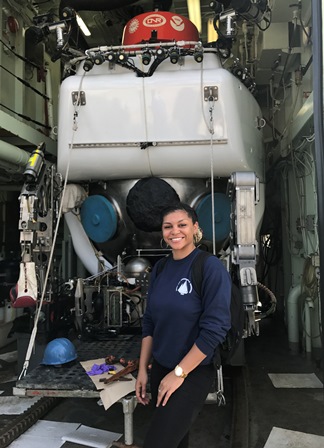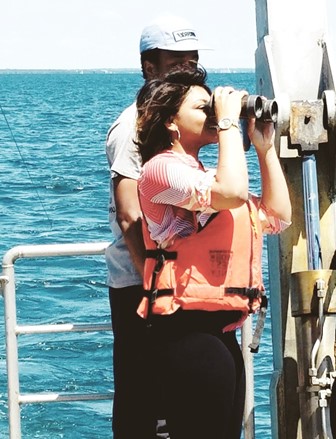
By Kanieka Z. Neal, UMES chemistry major
Monday, February 19, 2018
I had the opportunity this past summer to return to Woods Hole Oceanographic Institute in Massachusetts and conduct bio-geochemical research alongside Dr. David Nicholson and Hilary Palevsky, a post-doctoral student.
As a rising junior in 2016, I took an environmental science class offered through the summer program in Woods Hole and earned four credits toward my chemistry degree. I was eager to go back.
More than 300 students applied for the 2017 Student Fellows program, and only 30 were accepted. I lived with fellow students from Harvard, the Massachusetts Institute of Technology, Yale and Duke, which is pretty impressive for a UMES student! (And international students from Norway and Canada, too.)
I worked on a three-month long project analyzing the biophysical and thermal effects on partial pressure carbon dioxide (pCO2) samples from the North Atlantic (ocean) gathered between 2014 and 2016.
I also attended weekly seminars and workshops featuring Woods Hole scientists as well as those from such prominent universities as MIT, Harvard and Yale.
These workshops filled my knowledge gap. I met prestigious scientists from all over the world at the “Ocean Carbon and Bio-geochemistry Workshop,” which featured presentations like “Carbon fluxes in coastal wetlands” and “Ecological and bio-geochemical impacts of natural climate perturbation.”
I learned a lot about global warming and the current research that’s being done on it.
I also learned how to use a Matrix Laboratory (Matlab) from MIT tutorials and my mentor. Matlab is an essential tool when extracting data files, analyzing and interpreting data.

A friend who was an environmental science major had applied the previous summer for a Woods Hole internship and told me about it. Initially, I thought I would not like it, but I gave it a try.
My advice to students is to APPLY and take that chance.
I did receive a stipend, and they also paid for my travel. I used that money towards books and supporting myself. The previous summer, part of my WHOI stipend went towards my international service learning trip to the Dominican Republic during winter break as a member of the Richard A. Henson Honors Program.
The Woods Hole internship provide me the opportunity to work on my writing skills, communication and presentation skills. This program builds these skills by incorporating midterm & final presentations as well as a poster presentation at the conclusion of the internship.
Looking back, the experience was out of my comfort zone, but that is how I grew as a student and individual. I knew nothing about chemical oceanography, but the experience provided me with the chance to learn. My main goal was to leave with more knowledge than when I came. I achieved that.
I met so many important people that I can (now) go to for advice or receive a recommendation letter because you get to build that bond with your mentor and truly get to know them, their strengths and their weaknesses.
When I graduate this year, my goal is to work for the federal government as a forensic chemist or perhaps as an environmental researcher.
To learn more about these kind of hands-on internship programs for science majors, contact UMES’ Department of Natural Sciences;(410) 651-6015

